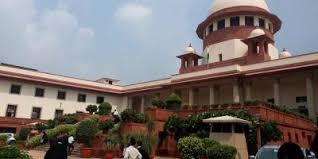(A) Andhra Pradesh (Agricultural Produce and Livestock) Markets Act, 1966, Sections 2(v),2(xv). – Agricultural Produce – Whether “ghee” is a “product of livestock” under the provisions of the Act, 1966? – Argument that “ghee” is not a product of livestock held to be baseless, and bereft of any logic – Held that the contrary argument that “ghee” is indeed a product of livestock is logically sound – Livestock has been defined under Section 2(v) of the Act, where Cows and buffalos are the livestock – Undisputedly, “ghee” is a product of milk which is a product of the livestock – Reasoning adopted by the Full Bench of Andhra Pradesh High Court that ‘Ghee’ is derived out of ‘milk’ by undergoing a process, yet it still remains a product of livestock, for the purposes of the Act and payment of “market fee” upheld. (Para 10)
(B) Andhra Pradesh (Agricultural Produce and Livestock) Markets Act, 1966, Sections2(xv), 3(1), 3(3), 3(4), 4(3) – Agricultural Produce – Ghee – Whether the Government notification (G.O. Ms. No.286 dated 05.07.1994), which inter alia notifies “ghee” as one of the products of livestock for the purpose of regulation of purchase and sale of “ghee” in all notified market areas was published after due compliance of the procedure contemplated under the provisions of the Act? – Contention of the appellant that the procedure given under Section 3 of the Act has not been followed held to be not correct – A perusal of Sections 3 and 4 of the Act clearly shows that whereas a draft notification is mandatory under Section 3 and so is the hearing of objections to the draft notification, there is no similar provision under Section 4 of the Act – A prior hearing or prior publication of the draft notification is not a requirement under Section 4 of the Act, since the notification of the year 1994 is a notification under Section 4 and not of Section 3 of the Act – No prior process was required to be followed as contemplated under Section 3 of the Act for working the scheme under Section 4 of the Act – Held that there was nothing wrong in the 1994 notification and the challenge to the notification has rightly been turned down by the Full Bench of the Andhra Pradesh High Court. (Para 11)
(C) Andhra Pradesh (Agricultural Produce and Livestock) Markets Act, 1966, Sections 2(v), 2(xv), 4(2) – Agriculture Produce – Government notification (G.O. Ms. No.286 dated 05.07.1994), which inter alia notifies “ghee” as one of the products of livestock for the purpose of regulation of purchase and sale of “ghee” in all notified market areas – As per section 4(2) of the Act, the Market Committee has the duty to enforce the provisions of the Act within a notified area. Section 4(3), which empowers Market Committees to establish markets within the notified area, also directs that these Market Committees have to provide facilities in the markets for the purchase and sale of notified products – Appellants’ argument that these Market Committees did not provide any facilities has already been dealt with and rejected by the High Court and view as that taken by the High Court upheld –Held that the appellants have availed the facility given by the Market Committee and hence they are liable to pay the fee – There may also be a question of unjust enrichment here and that this market fee should be paid as well – The appellants’ prayer that Respondent Market Committees should be restrained from collecting market fees prior to the date of the High Court Judgment cannot be accepted – Since this fee which has now accumulated for more than 14 years between 05.07.1994 to 01.05.2009 may entail some hardship on the appellants, they shall be permitted to deposit this fee with the Committee within two years from today, in four equal instalments. (Para 12 to 14)
SUPREME COURT OF INDIA
2024 STPL(Web) 149 SC
[2024 INSC 174]
Sangam Milk Producer Company Ltd. Vs. The Agricultural Market Committee & Ors
Civil Appeal No.6493 of 2014 With C.A. No. 6494 of 2014 C.A. No. 6495 of 2014 C.A. No. 6496 of 2014 C.A. No. 6497/2014 C.A. No. 6498 of 2014 -Decided On 05-03-2024
https://stpllaw.in/wp-content/uploads/2024/04/2024-STPLWeb-149-SC.pdf







